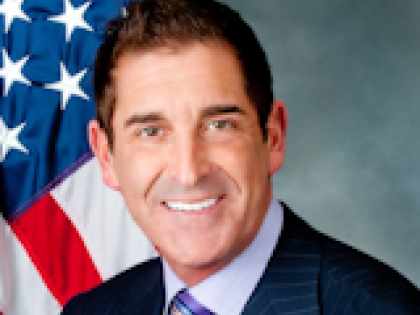
State Senator Jeff Klein and NYC Councilman Ritchie Torres release “Worst Landlord in NYC?” joint investigative report detailing deplorable conditions in NYCHA buildings
Jeffrey D. Klein
February 12, 2015
Elected Officials and Housing Advocates call for state funding with stronger accountability to repair and upgrade NYC’s public housing stock
New York, NY – State Senator Jeff Klein (D-Bronx/Westchester) and New York City Councilman Ritchie Torres (D-Bronx) today released a joint report, “Worst Landlord in NYC?” detailing the deteriorating conditions of some of the New York City Housing Authority’s developments throughout the five boroughs.
Klein and Torres, joined by State Senators Diane Savino (D-Staten Island/Brooklyn) and Adriano Espaillat (D-Manhattan), Senior Policy Analyst Victor Bach of Community Services Society of New York, Maritza Silva-Farrell of the Real Affordability for All Coalition and Ann Valdez, a public housing resident and member of Community Voices Heard, also called for a City and State funding reinvestment in NYCHA with stringent accountability procedures and benchmarks in order to ensure that the widespread state of disrepair and serious personal and public safety issues are remedied in a timely and efficient manner.
The joint report included photographs taken by Klein staff that exposed decaying, unsafe conditions in various New York City public housing buildings. The investigators captured scenes of hallways strewn with debris that had recently caught fire, dark stairwells with blown lights and collapsed plaster ceilings. Surveyors also discovered buildings that lacked working fire exit safety doors as well as unsecured entrance doors and rooftop building access.
“It’s shameful that public housing residents in this city live in such unpleasant and clearly unsafe conditions. Plaster raining from ceilings, charred hallways and fire doors that don’t work, garbage littered throughout buildings, and unrepaired damages that could cause personal injury or harm are simply unacceptable,” said Senator Klein. “The IDC’s NYCHA 2020 proposal addresses this public housing crisis by reinvesting in NYCHA, and I am confident that by working with the city and its new NYCHA commissioner we can make certain that any investment of state funds is spent wisely.”
“The City and State’s historic disinvestment from NYCHA represents a level of neglect that no elected official would ever tolerate from a private landlord,” said Councilmember Torres. "I commend Senator Klein, Senator Espaillat, and all of our champions in Albany for their commitment to the future of public housing.”
“We heard NYCHA Chairwoman Oyatole talk about ‘deplorable’ conditions at a City Council hearing — and we agree. Those conditions don’t just exist in the developments the city is looking to sell to private developers. We found deplorable conditions in many buildings operated by NYCHA and we want to help NYCHA Chairwoman Oyatole fix these problems,” said Senator Savino.
“The New York City Housing Authority should be a beacon of support for those communities most in need. Instead, the “Worst Landlord in NYC?” report reveals the grim truth about the disgraceful state of NYCHA housing. We must make certain that these communities receive the safety, cleanliness and respect that they deserve, and that any taxpayer dollars that are invested are well spent. The IDC’s NYCHA 2020 proposal will ensure that we address these fundamental problems at their core, all while sensibly investing public funds,” said State Senator Tony Avella (D-Bayside).
“The City’s housing crisis will not be fully addressed until we repair NYCHA’s poorly maintained housing stock. The plan laid out today for revitalizing NYCHA would set a new standard of transparency and efficiency at the agency, and provide the resources it needs to repair and properly maintain the homes of thousands of hard working New Yorkers. The State and City must work together to ensure everyone has access to adequate affordable housing,” said Senator Espaillat.
“The Community Service Society welcomes this Albany initiative to commit significant capital dollars to help meet the infrastructural needs of NYCHA's aging buildings. It is time for the state to fulfill, not ignore, it's responsibilities to NYCHA and its residents,” said Victor Bach, Senior Policy Analyst, Community Services Society of New York.
“Public housing is a vital but neglected source of affordable housing for hundreds of thousands of New Yorkers. We cannot have real affordability for all until the quality of public housing is strengthened. For too long, NYCHA has operated as one of the worst landlords. The findings of this investigative report are deeply disturbing and cannot be ignored by NYCHA. We are proud to join this campaign for greater accountability of NYCHA, and to help push for increased state investment in public housing to ensure that long overdue repairs finally get made,” said Maritza Silva-Farrell of the Real Affordability for All Coalition.
“Community Voices Heard is glad that there is a call for Albany to dedicate more funding to NYCHA, especially given that a real commitment on their part has been missing for a number of years and we believe that this funding is a great starting point,” said Ann Valdez, a public housing resident and member of Community Voices Heard.
The IDC’s Invest NY proposal includes a NYCHA 2020 plan to remedy challenges currently facing public housing in New York City. The plan includes:
- $500 million investment – The state would provide $250 million in capital funding to NYCHA with the requirement that NYC provide another $250 million in matching funds. These funds would be available immediately for repairs, reconstruction and upgrades. Continued use of this funding beyond January 1st, 2016, would be contingent on NYCHA’s adoption of the NYCHA 2020 Revitalization & Reform Plan. This plan creates accountable guidelines to reform the authority’s management, streamline its procurement and repairs, improve its customer service, reduce its bureaucracy, and set NYCHA on a path to long-term financial sustainability.
- Restoration of $12 million in state aid – The IDC proposes restoring the state’s annual subsidy of $12 million to NYCHA. In addition, the state would also match any savings in operating costs that NYCHA realizes through implementing the NYCHA 2020 reform plan.
- NYCHA Repair Certificate – This program would allow private developers to obtain a zoning bonus (higher FAR) in areas being up-zoned in exchange for conducting expeditious repair work in NYCHA buildings. This would increase the repair speed since NYCHA’s work orders can extend as long as two years.
- NYCHA Watchdog – An annual public report, compiled by an independent watchdog, would be sent to the City Council, the Office of the Mayor of the City of New York and the Department of Housing and Community Renewal detailing the conditions of each NYCHA development and the status of repairs.
YouTube videos of conditions found in NYCHA developments as part of the investigation are available on channel - IDC NYCHA Report.

